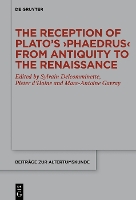


|
|
|
books
| book details |
The Reception of Plato’s ›Phaedrus‹ from Antiquity to the Renaissance
Edited by Sylvain Delcomminette, Edited by Pieter d'Hoine, Edited by Marc-Antoine Gavray

|
| on special |
normal price: R 7 261.95
Price: R 6 535.95
|
| book description |
This volume explores the tremendous influence of Plato’s Phaedrus on the philosophical, religious, scientific and literary discussions in the West. Ranging from Plato’s first readers, over the Church Fathers and the Platonic commentators, to Byzantine and Renaissance thinkers, the papers collected here introduce the reader to the first two millennia of the dialogue’s reception history. Thirteen contributions by both junior and established scholars study the engagement with the Phaedrus by such major figures as Aristotle, Galen, Origen, Clemens of Alexandria, Plotinus, Augustine, Proclus, Psellus, Ficino, Erasmus, and many others. Together, they cover the wide range of topics discussed in the dialogue: the value of myth and allegory, religion and theology, love and beauty, the soul and its immortality, teaching and learning, metaphysics and epistemology, rhetoric and dialectic, as well as the role and the limits of writing. By placing the dialogue in this broad perspective, the volume will appeal to readers interested in the Phaedrus itself, as well as to classicists, literary theorists, and historians of philosophy, science and religion concerned with the dialogue’s reception history and its main protagonists.
| product details |

Normally shipped |
Publisher | De Gruyter
Published date | 6 Jul 2020
Language |
Format | Hardback
Pages | 292
Dimensions | 230 x 155 x 0mm (L x W x H)
Weight | 546g
ISBN | 978-3-1106-8363-9
Readership Age |
BISAC | literary criticism / ancient & classical
| other options |
|
|
|
To view the items in your trolley please sign in.
| sign in |
|
|
|
| specials |
|
Let's stare the future down and, instead of fearing AI, become solutionists.
|
|
|
This first comprehensive biography of Cecil Rhodes in a generation illuminates Rhodes’s vision for the expansion of imperialism in southern Africa, connecting politics and industry to internal development, and examines how this fueled a lasting, white-dominated colonial society.
|
|
|
|